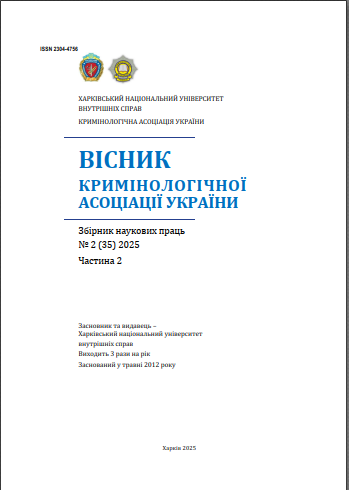СУТНІСТЬ КОРУПЦІЇ У СУДОВІЙ СИСТЕМІ
DOI:
https://doi.org/10.32631/vca.2025.2.60Ключові слова:
корупція, корупційні правопорушення, судова система, судді, працівники судуАнотація
У статті визначено ознаки поняття «корупція» є наступні:
1) наявність спеціального суб’єкта вчинення корупційного правопорушення, –
особи, наділеної владними повноваженнями; 2) вчинення нею неправомірних
діянь (дії чи бездіяльності), тобто використання свого службового
становища з порушенням публічних інтересів, забезпечення реалізації яких є
обов’язком відповідної особи; 3) наявністю корисливих мотивів вчинення
такого діяння; 4) негативні наслідки. З’ясовано, що корупція у судовій
системі України - це суспільно-небезпечне явище, яке виражається у
використанні суддями чи працівниками судових органів свого службового
становища, всупереч принципам законності та справедливості, з метою
отримання особистої вигоди або переваг для інших осіб, що проявляється у
прийнятті неправосудних (несправедливих) рішень, упередженості та
підпорядкованості стороннім інтересам і в результаті підриває
верховенство права та довіру громадян до судової влади.
Констатовано, що корупція у судовій системі має такі негативні
наслідки: по-перше, фактичне заперечення принципів верховенства права,
законності та рівності перед законом; по-друге, безкарність корупціонерів, а
також бізнес та політичних еліт; по-третє, підрив довіри громадян до
держави та її інституцій; по-четверте, гальмування інвестицій в економіку
країни, а відтак і фінансово-економічного розвитку країни; по-п’яте,
формування атмосфери цинізму та правового нігілізму в суспільстві; по-
шосте, посилення тіньових схем та криміналізації суспільних відносин.
Завантажити
Завантаження
Опубліковано
Номер
Розділ
Ліцензія
Авторське право (c) 2025 Є.Ю. ШАПТАЛА

Ця робота ліцензується відповідно до ліцензії Creative Commons Attribution 4.0 International License.

